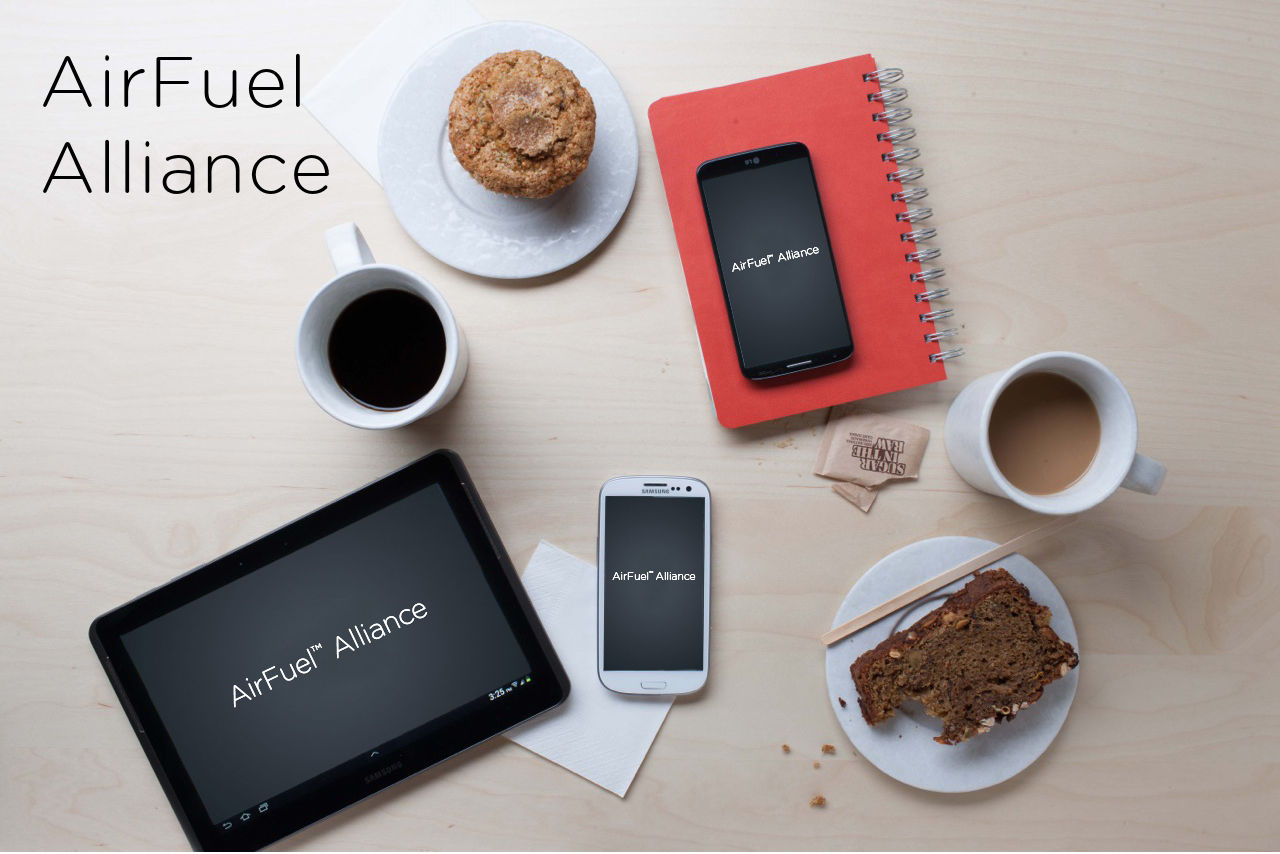Wireless Charging Adoption Gets A Nudge As A4WP, PMA Rebrand As 'AirFuel Alliance'
The Alliance For Wireless Power (A4WP) and the Power Matters Alliance announced a combined organization called the AirFuel Alliance. Going forward, AirFuel will also become the brand identity of the two organizations' wireless charging technologies.
The Power Matters Alliance started out with inductive charging, the same wireless charging technology behind WPC's Qi, but on a different frequency. Then the A4WP came out, which brought a "next-generation" wireless charging technology, in the sense that it freed devices from having to stay in a fixed location to charge. Instead, people could put the devices in a relative charging area (such as anywhere on a table). This new technology was called Rezence, which comes from "magnetic resonance" charging. We first saw Rezence in action at IDF 2014.
Rezence, like any other wireless charging technology that increases the charging distance from the transmitter to the receiver, has a disadvantage -- the longer the distance, the less efficient it is to charge the devices. This means you lose more power than what gets into the device's battery, and the device could also charge slower.
As both technologies have their own complementary advantages and disadvantages, the two organizations decided to join powers, so to speak, and create a single multi-mode solution, which they are now branding as "AirFuel."
"The introduction of AirFuel is a clear step in the right direction for true wireless charging. AirFuel Alliance is committed to bringing to life technology that uses AirFuel while continuing to be open to further industry consolidation," said Ron Resnick, President of AirFuel Alliance.
After a period of time, the older brands will be retired and new products will have the new AirFuel logo and certification. According to the new organization, AirFuel will become synonymous with "fast, convenient, and readily available wireless charging."
Ultimately, the alliance aims to make it easier and less confusing for both OEMs and consumers when choosing a wireless charging technology. However, after this unification, and considering that the consortium already has 195 members including Qualcomm, Intel, Mediatek, Samsung, AT&T, Starbucks, and others, it should become quite difficult for the Qi standard to maintain relevance when AirFuel can provide both inductive and resonant charging. At this point, AirFuel is likely on its way to become the "Wi-Fi" of wireless charging.
Get Tom's Hardware's best news and in-depth reviews, straight to your inbox.
______________________________________________________________________
Lucian Armasu joined Tom’s Hardware in early 2014. He writes news stories on mobile, chipsets, security, privacy, and anything else that might be of interest to him from the technology world. Outside of Tom’s Hardware, he dreams of becoming an entrepreneur.
You can follow him at @lucian_armasu. Follow us on Facebook, Google+, RSS, Twitter and YouTube.
Lucian Armasu is a Contributing Writer for Tom's Hardware US. He covers software news and the issues surrounding privacy and security.
-
TwoSpoons100 I just want to point out that all of the wireless power standards use resonant systems to transfer power. The only differences are the frequency and communication protocols. The use of "inductive" vs "resonant" is just marketing BS.Reply
The choice of operating frequency is a tradeoff between cost, efficiency, range and field strength safety limits.
Its VHS vs Betamax all over again - but with no clear technical advantage to either side. -
edlivian Airfuel is going to have a difficult time becoming dominant standard. Qi products probably outsell the other two companies close to 1000 to 1. This article sounds like an advertisement for airfuel, there is no journalistic quality to this arotcle. Author even goes on to say that airfuel is primed to be the wifi of wireless charging is laughableReply -
InvalidError Reply
Qi and Rezence/AirFuel do not really cater to the same market.16889837 said:Airfuel is going to have a difficult time becoming dominant standard. Qi products probably outsell the other two companies close to 1000 to 1.
Qi is intended as a direct alternative to wired charging that requires close proximity to the charging station while AirFuel is intended to provide power over short distances, which could be useful to power wireless mice, keyboards, headsets, smart watches, IoT sensors, remote controls and all sorts of other low power devices.
-
scolaner ReplyAirfuel is going to have a difficult time becoming dominant standard. Qi products probably outsell the other two companies close to 1000 to 1. This article sounds like an advertisement for airfuel, there is no journalistic quality to this arotcle. Author even goes on to say that airfuel is primed to be the wifi of wireless charging is laughable
Hm, I don't follow.
It is true that Qi is more ubiquitous. But it's been on the market, and mature, longer. So what? Qi is limited in many ways. These other emerging technologies promise more than Qi can offer. And they're backed by industry powerhouses, not the least of which is Intel.
It seems like maybe you didn't read the whole article or any of the links?
-
edlivian Many of the supporters on airfuel are also supporters of qi, the article failed to disclose that. They are just hedging their bets, but the only save airfuel ever gets off the ground is if Apple adds support to any idevice. But knowing apple, the will just come up with their own standard they will force down your mouth.Reply

